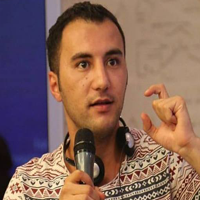حقّقت الصحفية التونسية أمل المكّي خرقاً في العلاقة بين الصحافة والحكومة في تونس، بعدما تمكّنت من الحصول على حكم قطعي يُلزم وزارة الداخلية التونسية بتزويدها بمعلوماتٍ كانت قد حجبتها عنها.
وجاءت هذه العملية ضمن ما يُعرف بقانون "النفاذ إلى المعلومة" الذي تعتمده تونس رسمياً، إلى جانب دولٍ عربية قليلة كالأردن ولبنان.
ويُعتبر "حق الحصول على المعلومة" واحداً من الحقوق الإنسانية الأساسية، غير أنّه ما زال غائباً حتى اليوم عن معظم الدول العربية.
يضمن هذا القانون تأسيس هيئة متخصّصة في النفاذ إلى المعلومات، وتتلقّى هذه الهيئة دعاوى من الصحفيين والناشطين والعاملين في المجالات المختلفة، ضد جهات حكومية ورسمية حجبت عنهم هذه المعلومات. ويُفترض أن يكون قرار هذه الهيئة مُلزماً ومُصاناً في القانون، وهو ما من شأنه أن يسهّل مهمّة الصحفيين في الحصول على المعلومات والبيانات الرسمية اللازمة لإتمام قصصهم الصحفية.
تُعتبر الصحفية أمل المكّي من أوائل الصحفيين التونسيين الذين استخدموا هذا القانون منذ تفعيله في مارس/آذار 2016، عندما وافق البرلمان التونسي على مشروع قانون لتداول المعلومات يتيح ويمنح الحق لكل المواطنين في الحصول على المعلومات من المؤسسات العامة، بعدما صادقت لجنة الحقوق والحريات والعلاقات الخارجية بمجلس نواب الشعب التونسي على النسخة المعدلة لمشروع القانون المتعلق بالوصول إلى المعلومة.
الإجراء الحدودي
خلال العام 2018، بدأت أمل المكّي العمل على تحقيق استقصائي عن الإجراء "أس17" الحدودي وأنجزت التحقيق بإشراف ومتابعة موقع "إنكيفادا" التونسي، الذي قام بتصميم الرسوم البيانية ورسوم الانفوغراف وبدعم من شبكة "أريج"، وفاز التحقيق بجائزة أفضل تحقيق استقصائي للعام نفسه خلال مؤتمر مكافحة الفساد الثالث في تونس.
ويقضي هذا الإجراء بمنع انتقال التونسيين إلى الأقطار المصنّفة على أنها بؤر توتر مثل سوريا وليبيا.
ولكن التحقيق الاستقصائي الذي أعدّته أمل أثبت أن هذا الإجراء أدى إلى تضييق التنقل للمواطنين التونسيين إلى خارج تونس، إضافة إلى التنقل بين المدن التونسية، وهو ما يخالف حق المواطن في التنقل باعتباره واحداً من أهم حقوق الإنسان.
وتعمل أمل المكّي (29 عاماً) كصحفية مستقلة في تونس، وبدأت تجربتها الصحفية كمراسلة لمجلة "شمس الجنوب" المحلية، ثم في صحيفة "حقائق" وإذاعة "كلمة" ثم موقع "حقائق أون لاين". كما عملت كصحفية مترجمة لصحيفة "الغارديان" البريطانية، وشغلت منصب مديرة الاتصال والإعلام في المعهد العربي لحقوق الإنسان، وساهمت بإنتاج مجموعة أفلام وثائقية وعملت في مجال التحقيقات الاستقصائية.

بداية الرحلة
تقول أمل إنها بعد أن بدأت العمل في التحقيق، لاحظت أن المؤسّسات التابعة لوزارة الداخلية التونسية لا تقدّم أي وثيقة للأشخاص المعنيين بالإجراء الحدودي، لأنها عندما تعطيهم هذه الوثيقة تكون قد أعطتهم الحق في مقاضاتها.
كما حاولت دحض رواية وزارة الداخلية التي تقول إن الإجراء الحدودي هدفه "منع الشباب من التوجه نحو بؤر التوتر"، حيث أجرت لقاءات مع فتيات ونساء وكبار بالسن طُبّق عليهم هذا الإجراء، كما مُنع أشخاص من السفر لأن أقرباءهم انتقلوا للقتال في ليبيا أو سوريا.
في مطلع مايو/أيار 2018، طلبت أمل إحصاءات ومعلومات من وزارة الداخلية عن أعداد التونسيين المشمولين بالإجراء الحدودي، إضافة إلى تعريف هذا الإجراء ومعايير تطبيقه. غير أن الوزارة لم ترد إطلاقاً على طلب المعلومات، بل طرحت أسئلة على الصحفية عن مخالفة إجراءات التقديم عندما سألتها عن سبب طلبها لهذه المعلومات وسبب تحقيقها في هذا الموضوع.
وتوضّح أمل أنّهم أخذوا نسخة من هويتها ونسخة من بطاقة انتسابها للنقابة، وهو ما يخالف إجراءات التعامل مع الصحفيين.
رفع الدعوى
لم تتجاوب وزارة الداخلية مع طلب الصحفية أمل، فلجأت الأخيرة إلى بابٍ لم يسبقها إليه أي صحفي في تونس، حيث تقدّمت بطلب إلى "هيئة النفاذ إلى المعلومة" في البلاد واستخدمت قانون حق الحصول على المعلومة، وقدّمت دعوى هناك. وبعد فترة وبينما كانت الهيئة تنظر في الدعوى، نشرت أمل تحقيقها على موقع "إنكفادا" التونسي وبدعم من شبكة "إعلاميون من أجل صحافة استقصائية عربية-أريج".
وبعد فترة من الزمن، أصدرت الهيئة قرارها بإنصاف أمل المكّي، وإلزام وزارة الداخلية بتزويد الصحفية بالمعلومات المطلوبة.
وتؤكّد أمل أن قرار الهيئة سيادي مُلزم، ولكن الوزارة لم تلتزم به وعادت للطعن في القرار أمام المحاكم.
لماذا كانت الأولى؟
في حوارنا معها، سألنا أمل عن سبب كونها أول صحفية استخدمت "حق الحصول على المعلومة"، وعدم قيام أي صحفي آخر بهذه الخطوة من قبل، فأجابت بأنه لا يوجد أي تعقيدات في عملية التقدّم بطلب إلى هيئة النفاذ إلى المعلومات.
وتشير إلى أن بعض الصحفيين غير واعين بأهمية قانون حق الحصول على المعلومات للحصول عليها في حال حجبها، لافتة الانتباه إلى أن مسألة طول المدة التي تستغرقها عملية صدور الحكم عن الهيئة، يجعل الصحفيين غير قادرين على الانتظار، لا سيما أولئك الذين يعملون على قصص وتحقيقات سريعة يتم إنجازها خلال أيام، بعيداً عن التحقيقات الاستقصائية التي يستغرق العمل فيها شهوراً وربما سنوات.
غير أن خطوة أمل كانت محرّضة لعدد من الصحفيين على استخدام القانون ذاته، حيث تقول إنه بعد صدور قرار الهيئة الذي ألزم وزارة الداخلية بتزويدها بالمعلومات، بدأ عدد من الصحفيين التونسيين يتقدّمون للهيئة، وأصبح هناك نوع من التوعية بأهمية هذا القانون بينهم.
وتبيّن أمل أن أهمية "قانون حق الحصول على المعلومات" لا تنحصر في الصحفيين فقط، بل تشمل المواطنين الذين من حقّهم الحصول على المعلومات الدقيقة.
وتعتقد أن النموذج التونسي في تطبيق قانون "حق الحصول على المعلومات" هو الأنجح من بين القوانين العربية، وتبرّر ذلك بأنّه لو تم وضع هذا القانون ضمن ترسانة القوانين الأخرى، سنجد أن تونس تحقّق مستويات متقدمة من الحقوق والحريات الفردية.
وتوضّح أمل أن نجاح دعوتها في هيئة النفاذ إلى المعلومات التي أنصفتها ضد وزارة سيادية، على الرغم من أنها المرة الأولى التي يُستخدم فيها هذا القانون من قبل الصحافة، يعطي مؤشّراً إيجابياً على تخطّي مراحل متقدمة في هذا القانون، مشيرة إلى أن وزارة الداخلية تُعتبر الأكثر سيادية في تونس، ومن ثم فإن خوضها معركة ضد هذه الوزارة وإنصاف القانون لها فإنما يدل على نموذج يُحتذى به عربياً.
وأضافت: "نعلم كصحفيين أن مهمّة وزارة الداخلية هي حفظ الأمن والقيام بعملها، ولكن نحن كصحافة تبقى أعيننا عليها إذا ما أفرطت في استخدام السلطة".
وتتابع أن قوى الشد والجذب إلى الخلف في تونس قوية، ولكن المجتمع المدني قوي أيضاً، لذلك فإن هذا النوع من المعارك (خوض تجربة النفاذ إلى المعلومة) يُعطي مؤشّراً على شكل البلاد خلال السنوات العشر القادمة.
وتشيد أمل المكي بالنتائج التي حققها التحقيق الاستقصائي، فأثناء مناقشة موازنة وزارة الداخلية لعام 2019 وصف الوزير مراجعة الإجراء الحدودي بأنّه "مطلب شعبي"، وأكّد أنه أول موضوع سيتم الاهتمام به من قبل الإدارة العامة لحقوق الإنسان في الوزارة، وهو ما يُعطي أملاً للضحايا والأشخاص المتضرّرين من هذا الإجراء.








































